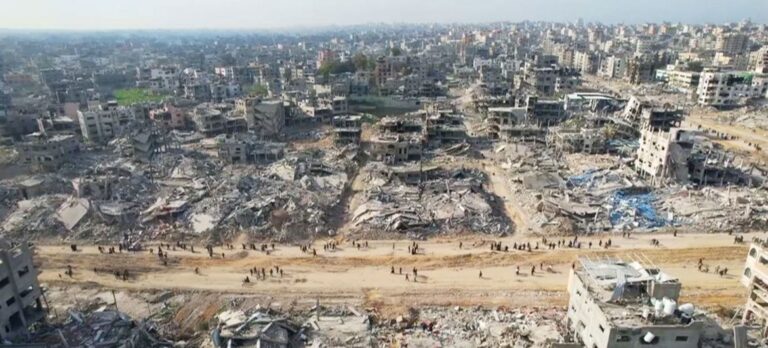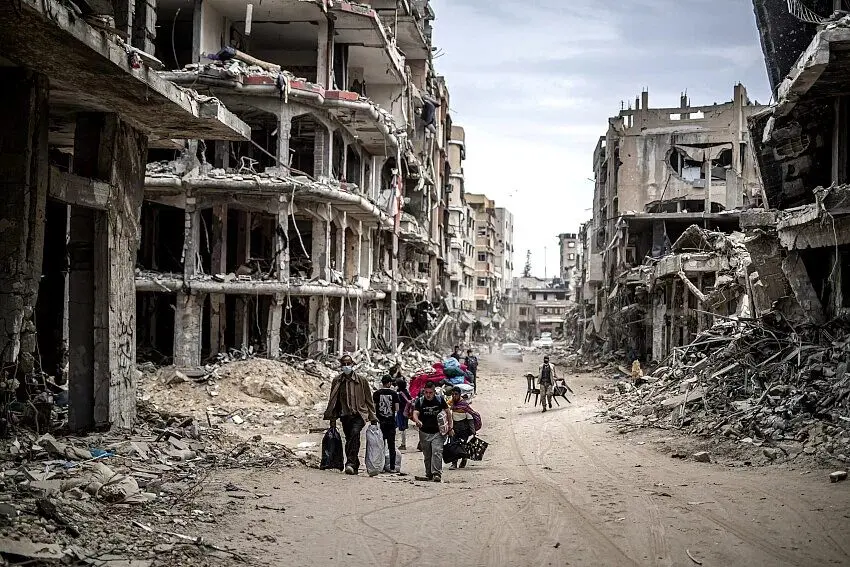Critical 5-Dunam Land Confiscation in al-Khalil Sparks Outcry Over Israeli Expansionist Policies

Dominance from Above: A panoramic eagle’s view of a territory in ruins, captured after being taken by Israel.” 13/7/2025
July 13, 2025 Hour: 12:40 pm
Israel orders land confiscation in al-Khalil to build settler-only road, drawing condemnation from Palestinian authorities and human rights groups. The move deepens territorial fragmentation and undermines peace prospects.
Related: Israel to Build Settlers-Only Road on West Bank Territory
Geopolitical Context Behind Israeli Land Confiscation in al-Khalil
The Israeli land confiscation in al-Khalil marks another escalation in the decades-long policy of land expropriation and settlement expansion in occupied Palestinian territories. On July 13, 2025, the Israeli military issued an order to seize over five dunams of land near the Palestinian villages of Sa’ir and al-Shuyoukh in Hebron (al-Khalil), citing “security and military needs.” However, the area will be used to construct a new road connecting illegal Jewish settlements — a move widely seen as part of a broader strategy to fragment Palestinian territory and entrench control.
This decision comes amid a surge in land seizures across the West Bank, where Israel has accelerated its colonization agenda under far-right minister Bezalel Smotrich. International observers warn that such actions not only violate humanitarian law but also undermine any realistic path to a two-state solution.
🔗 UN OCHA – West Bank Settlement Reports
New Military Order Targets Private Palestinian Land
Israeli forces have issued a new military directive authorizing the seizure of approximately 4.9 dunams of private land in al-Khalil, located near the towns of Sa’ir and al-Shuyoukh. According to official documentation reviewed by local media, the land will be used to build a road linking the illegal settlements of Asfar and Pnei Kedem — further isolating Palestinian communities and consolidating settler infrastructure.
This is not an isolated case. The Palestinian Resistance to the Wall and Settlements Commission confirmed that much of the confiscated land belongs to registered Palestinian owners, making the act a clear violation of international law.
“This isn’t just about land,” said a local activist. “It’s about erasing our presence and future.”
🔗 WAFA News Agency – Al-Khalil Report
Road for Settlers, Barrier for Palestinians
The planned road forms part of a wider network of settler-exclusive infrastructure that systematically restricts Palestinian access to their own lands and resources. This includes restricted movement zones, checkpoints, and land enclosures — all justified under vague security pretexts.
Human rights organizations have long criticized these measures as tools of de facto annexation. The route will link two unauthorized settlements — Asfar and Pnei Kedem — reinforcing a pattern of territorial disconnection that makes contiguous Palestinian statehood increasingly unattainable.
Local families whose land has been targeted report feeling trapped, with limited access to courts or legal recourse. Many say they were never consulted before the confiscation order was issued.

Context: Accelerated Colonization in the West Bank
The confiscation in al-Khalil fits within a larger wave of land grabs across the West Bank. In 2024 alone, Israeli authorities seized over 4,600 hectares, according to the Palestinian Central Bureau of Statistics (PCBS). Since the current cycle of violence began in October 2023, that figure has grown to more than 5,200 hectares, including areas previously untouched by settlement activity.
Today, the settler population exceeds 770,000, with nearly half living in East Jerusalem — a city claimed by Palestine as its capital. These numbers reflect a deliberate strategy to cement control through demographic and geographic dominance.
🔗 Palestinian Central Bureau of Statistics – Annual Report
Expansion Plans Under Far-Right Policy
In recent months, the Israeli government has approved 22 new settlements in the West Bank — the largest expansion since the Oslo Accords in 1993. Finance Minister Bezalel Smotrich, who oversees civilian affairs in occupied territories, has spearheaded efforts to formalize existing outposts and erase the Green Line — the internationally recognized boundary between Israel and the Occupied Territories.
These policies include the appropriation of agricultural land and Bedouin communities, effectively pushing entire populations into enclaves with minimal mobility or access to essential services.
Smotrich has openly declared his goal: “To make the West Bank part of Israel, permanently.”
Displacement and Humanitarian Impact
Communities like Shib al-Butum in Masafer Yatta face imminent forced displacement due to ongoing settler encroachment and state-backed demolitions. Amnesty International has documented widespread destruction of homes, restricted access to farmland, and increasing harassment by armed settlers — often protected by Israeli security forces.
“These policies create a climate of fear and dispossession,” said a researcher with Amnesty. “What we’re seeing is not just land theft — it’s the systematic dismantling of Palestinian life.”
Over 1,000 families now live under constant threat of eviction, with many unable to rebuild or repair damaged structures without facing fines or detention.
International Reactions and Legal Condemnation
The United Nations, European Union, and multiple human rights groups have condemned the confiscation, calling it a breach of international law, particularly Fourth Geneva Convention, which prohibits occupying powers from transferring parts of its population into occupied territory.
Despite these warnings, Israel continues its expansionist course, emboldened by growing ultranationalist influence in domestic politics and weak international enforcement mechanisms.
“The world watches, but does little,” lamented a UN spokesperson. “That silence enables further aggression.”
Dehumanization Through Systemic Violence
The Israeli land confiscation in al-Khalil represents a form of systemic violence that depersonalizes the Palestinian population. By reducing individuals to abstract obstacles in a cartographic expansion plan, the occupation strips them of agency and humanity. This mirrors what philosopher Giorgio Agamben described as the creation of “bare life” — where people exist under law but are denied its protections.
Anthropologically, these acts are part of a broader process of cultural erasure and spatial domination. When land — the physical and symbolic foundation of identity and continuity — is taken without consent or compensation, it severs intergenerational ties and destabilizes community cohesion. The construction of exclusive roads for settlers reinforces this division, transforming geography into a tool of exclusion rather than coexistence.
🔗 Amnesty International – Settler Violence Report
Conclusion: A Threat to Peace and Justice
The Israeli land confiscation in al-Khalil is more than a territorial dispute — it is a calculated step toward permanent control and the marginalization of Palestinian sovereignty. With each new road built for settlers and cadastral line redrawn in their favor, the possibility of a viable Palestinian state diminishes.
International calls for restraint grow weaker against the reality on the ground. As settlers expand and Palestinians retreat, the question remains: Will the world continue to observe — or finally act?

